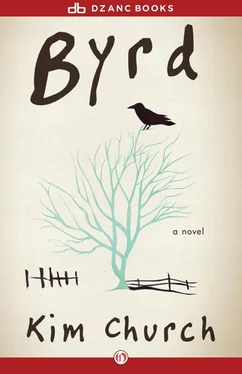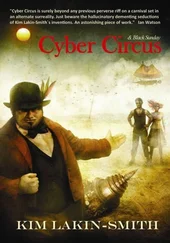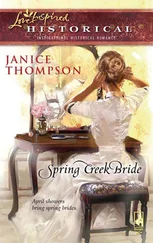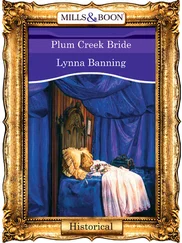In fourth grade she sits next to Shelia DeLapp and watches her practice her cursive: the slow, fat letters; the way Shelia bites her tongue when she writes; the way her hands sweat and make the notebook paper bubble up. At the end of every word, Shelia lifts her pencil off the page and rolls it around in her fingers to redistribute her weight on the lead.
Shelia spells her name with the L before the I , prettier than the way most people spell it, even though she pronounces it the same. She-la .
She is plain and shy, with a round face and slippery black hair that falls out of her barrette. Her eyes wobble when she’s nervous, a condition she was born with.
She invites Addie to her house after school, the green house behind the car wash. There’s a hole in the front porch; you have to be careful walking in. They sit at the kitchen table and play Crazy Eights. There’s a breeze; the curtain bats the window screen; the car wash whirs. Shelia’s hands sweat and make the cards sticky.
“I saw you staring at the new boy,” she says to Addie.
“I wasn’t staring.”
“He doesn’t even look at you when he looks at you.”
“I heard he hit his head at the swimming pool. I heard it did something to him.”
“Hitting your head doesn’t make you stuck-up.”
The new boy’s long legs jut into the aisle. His hair is shiny and dark as Coca-Cola. Addie once gave a boy her ice cream dime to let her touch his hair. It was short and flat on top — a brush cut, which she imagined would be stiff like the bristles of a toothbrush, but it was soft, like her father’s softest shoe brush.
The new boy writes left-handed, and when Miss Overcash calls him to the board for his times tables, he stands close, his elbow over his head and his face almost against the board so that no one can see his wrong answers until he’s finished. He gets chalk dust on his shirt from standing so close. Miss Over-cash has to brush him off. It’s embarrassing to watch, but thrilling, too, like watching someone get punished. He stands very still and stares out the window as if he’s somewhere else, as if that isn’t chalk dust flying off his shirt.
In the cafeteria he bites his ice cream sandwich into a different animal shape every day. People call out: Giraffe! Elephant! Bear! Addie calls out, but he never makes hers. Once he was making a rabbit so she said Rabbit! But then he changed it into something else.
She thinks his name sounds like a place. Roland Rhodes. A faraway place. One that would take a long time to get to, and once you did, you would never want to come back.
“The Rhodes woman came in today,” Addie’s mother announces over supper, which is canned ham, canned green beans, and sliced cranberry sauce. “The new doctor’s wife. Acting like a doctor’s wife.”
Addie’s father makes a face. “He’s a chiropractor.”
Her mother laughs the way she does when something isn’t funny. A small, sour sound.
Her parents do this every night, complain about people they know, or used to know, or barely know, or don’t know at all.
“Roland’s in my class,” Addie says.
“First time she’d set foot in the store and she wanted to take five dresses out on approval. Said her daughter didn’t have patience for shopping. I wanted to say, What child does?”
Addie’s mother works at the Carousel Shoppe selling expensive girls’ dresses to mothers who don’t have to work. Dress-up dresses: Peaches ’N Cream and Polly Flinders and Ruth of Carolina Originals with sashes and built-in crinolines and Peter Pan collars, stripes and plaids all perfectly matched at the seams. She can buy dresses for Addie because of her employee discount — the only part of her job she likes. As soon as Addie outgrows girls’ sizes she plans to quit and get an office job.
“Roland has nice clothes,” Addie says. She closes her eyes and remembers his paisley shirt, the swirls of blue and purple and green.
“Your clothes are as nice as anyone’s,” her mother says, and reaches over to cut up her little brother’s ham.
After dinner their father leaves the table and their mother tells stories. “Tell the one about the birthday cake,” they say, and Claree tells about the time when she was a girl and baked a cake for her father, their grandfather. A sheet cake with lavender frosting. She hid it under her bed, planning to surprise him. That evening while she was cooking supper, her mother went upstairs and found the cake, slid it out from under the bed, stomped on it and smashed it flat. Then walked down to greet Claree’s father, her shoes thick with frosting.
“Those big black orthopedic shoes,” Claree says. “She always had trouble with her feet.”
Addie and Sam laugh. They think the story is supposed to be funny.
Sam is four years younger than Addie, with eyes gray as nickels and hair so short you can’t tell what color it is.
Addie has red hair, which she is not allowed to cut. Girls aren’t supposed to cut their hair. Her mother’s hair comes all the way to her knees, black with a long silver stripe, her birthmark. No one at Addie’s school has a mother with hair as long as Claree’s.
Addie’s father works at Reliable Loan Company, in a building on West Fifth Avenue that used to be a house. The company has a billboard on the highway, a giant picture of a dollar bill, but instead of George Washington, there’s Bryce Lockwood in his big square glasses and plaid sport coat. When the sign was new he would take the family for rides in the car just to look at it.
At school, Addie is the Dollar Man’s daughter.
Bryce’s gold velour armchair and ottoman take up the middle of the living room. He likes to stretch his legs while he watches TV. Their set has rabbit ears and thirteen channels on the knob. When it’s time for a different show, Bryce makes Sam change channels.
“While you’re up,” he tells Sam, “how about grab me another beer?”
Sam goes in the kitchen, brings back a cold can of Schlitz, hands it to his father.
“Come a little closer,” Bryce says. “I want to tell you something.”
“Don’t,” Addie says. “It’s a trick.”
But Sam doesn’t listen. He never listens. He leans over, hoping to be let in on a secret, a joke, something Addie wouldn’t get, and Bryce flicks him on the head with his middle finger, the way you thump a melon. Sam’s head makes a sharp, hollow sound.
Their mother sits at one end of the sofa, leaning against the arm, her long black hair splayed out across the plaid upholstery. It looks clingy, like cobwebs. She watches TV as hard as she can.
In middle school everyone has to take P.E. The girls wear starchy blue gym suits with snaps down the front. Sally Greer, the first in their class to develop, is always popping out of hers. Sally tells everyone she’s dating Roland Rhodes. “We made out under the bleachers,” she says.
After school, Shelia’s mother, Betsy, makes them glasses of Tang, the drink of the astronauts, with Tang ice cubes. Betsy knows how to make everything better. She works the early nursing shift at the hospital and gets off before school is out; by the time Shelia and Addie get home, she’s changed out of her white uniform and into her afternoon clothes: baggy shirt, pants, unlaced brogans — old clothes her husband, Shelia’s father, left behind. He’s been gone for years. Shelia doesn’t remember him.
“Staying for dinner, Addie?” Betsy ties on her apron, reaches under the cabinet, and lifts out a white coffee-can-sized can with no label, just MEAT in big black letters, which she plunks on the counter. “Could be pork chops.”
“Sure,” Addie says, “I like pork chops.”
Betsy has short hair, which she cuts herself and dyes yellow. She is loud like a man, and likes to whistle.
Читать дальше












